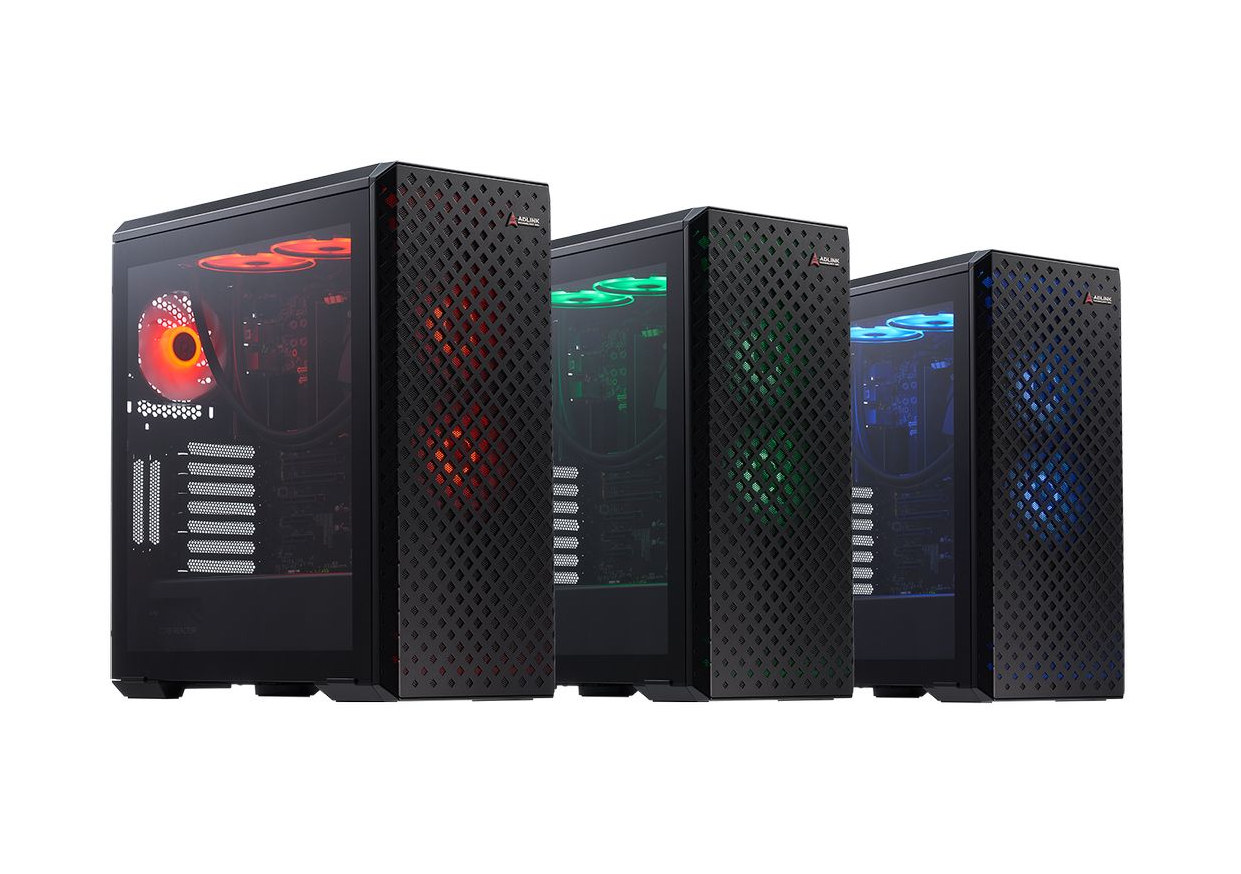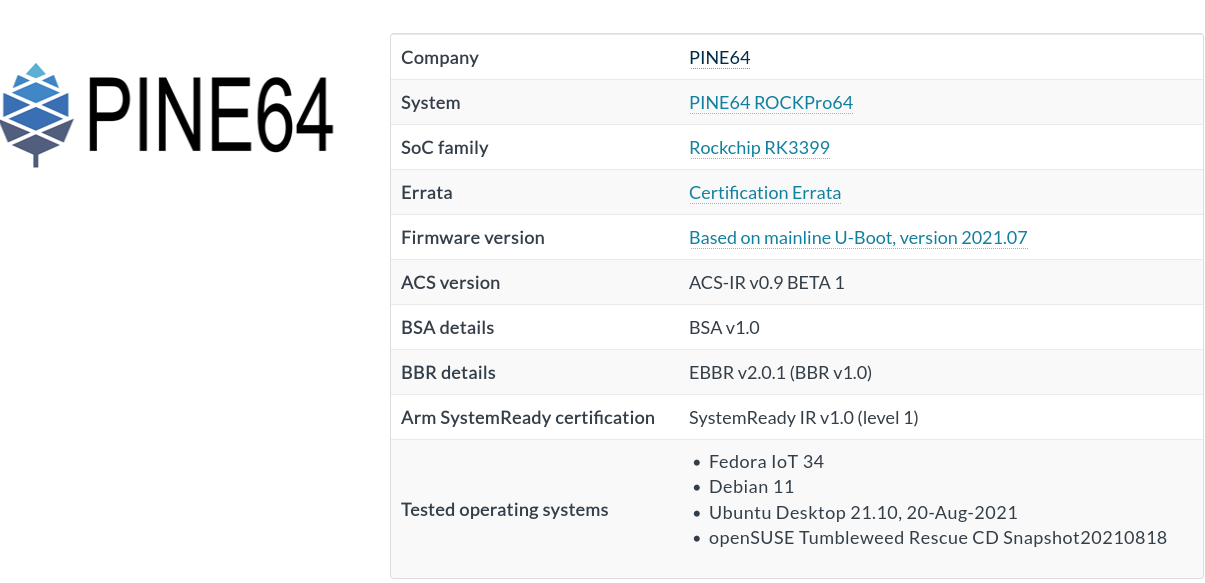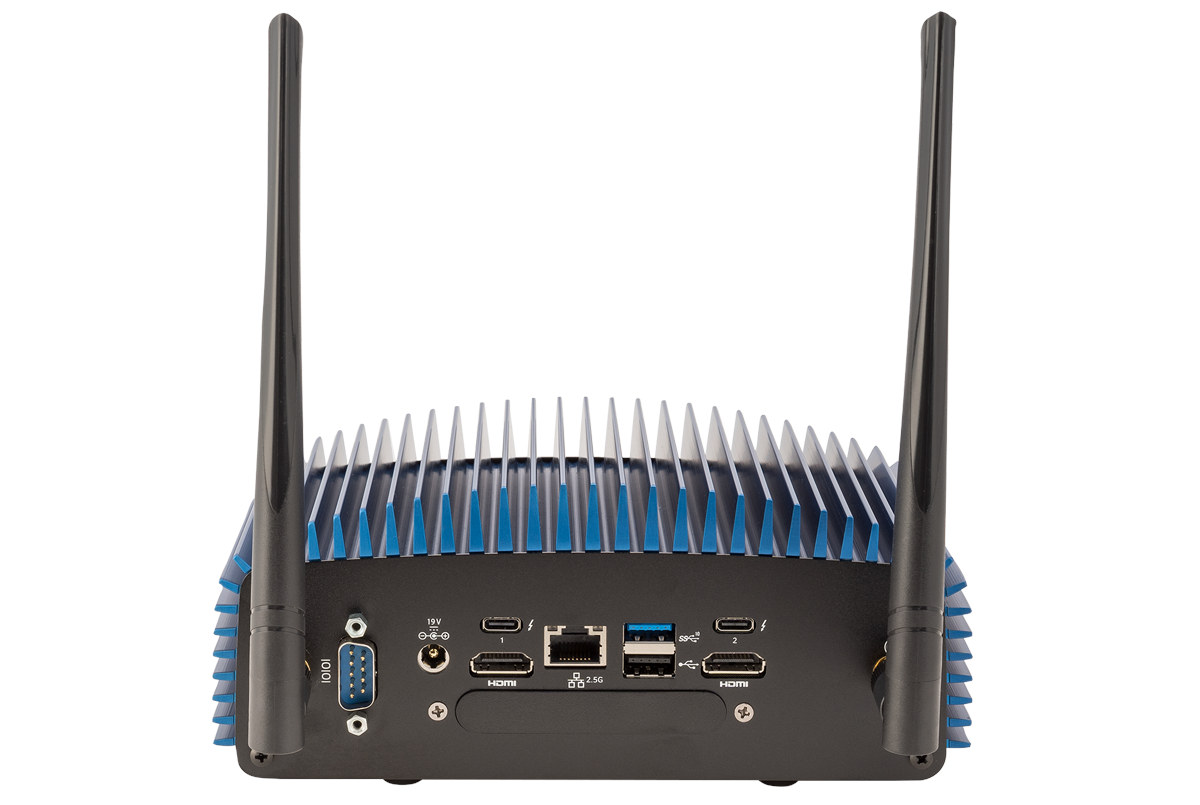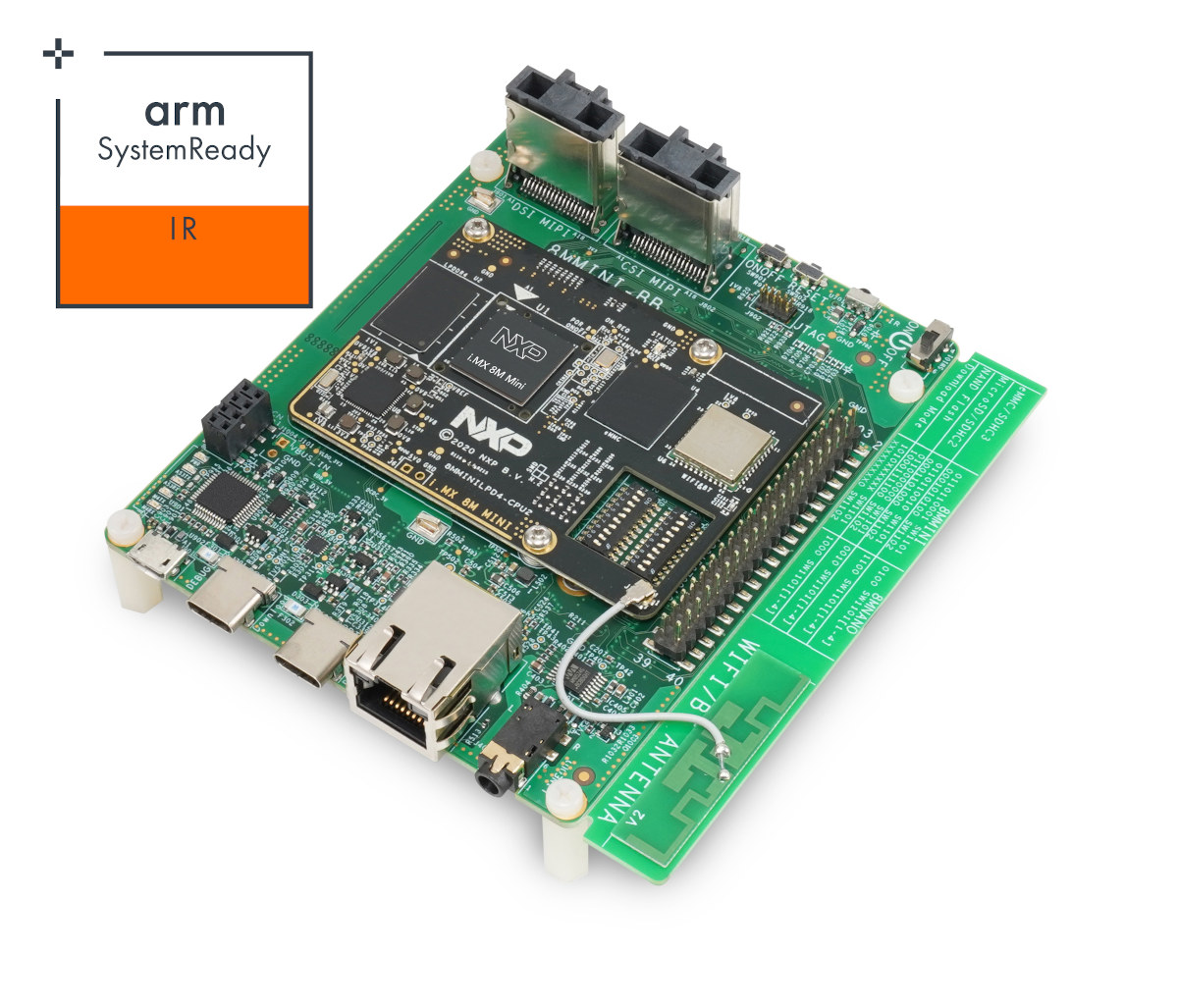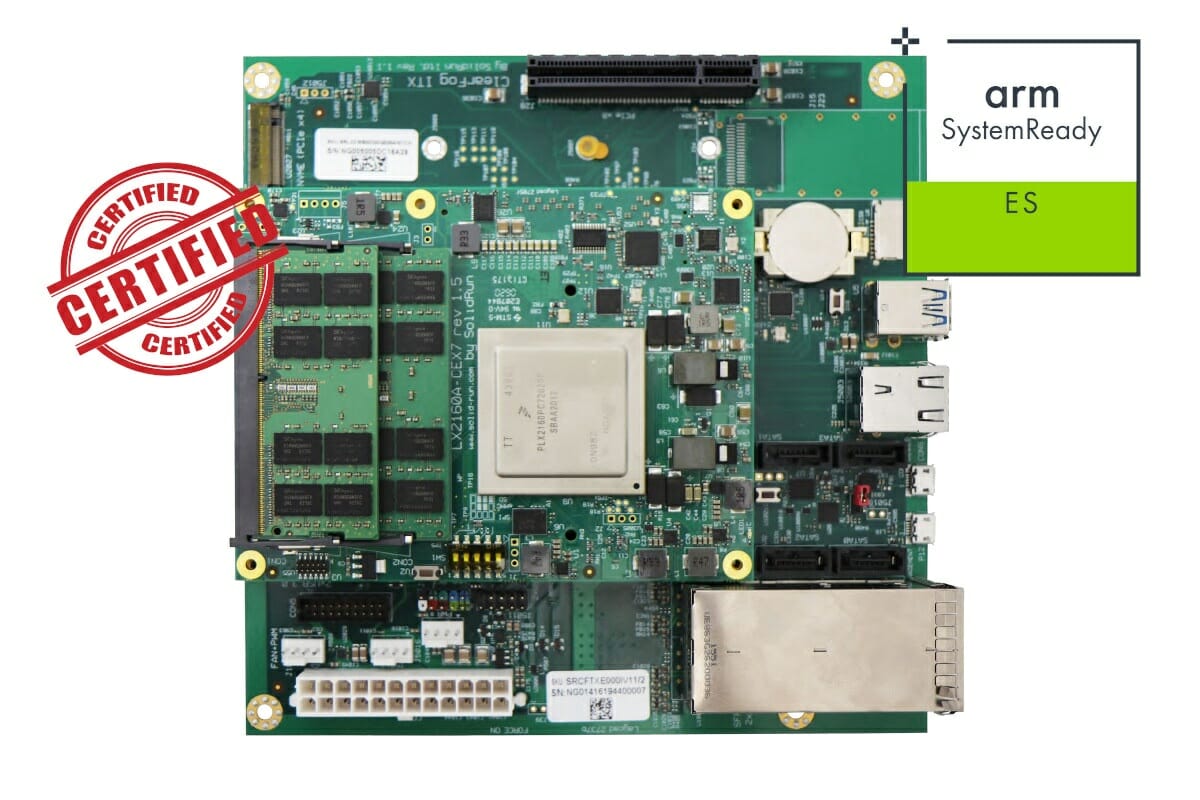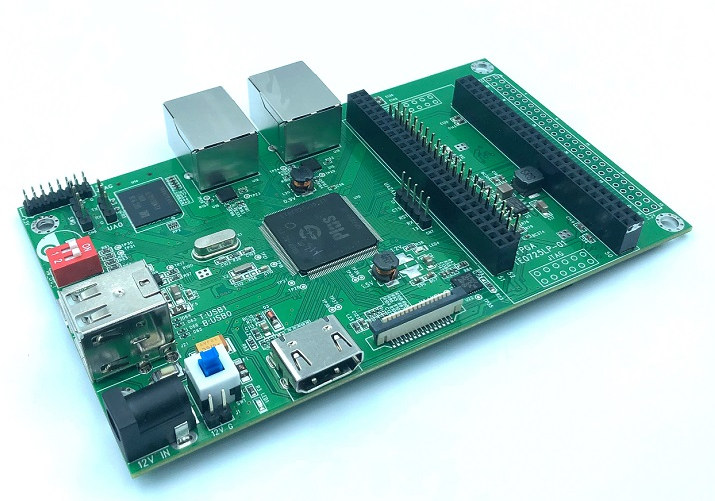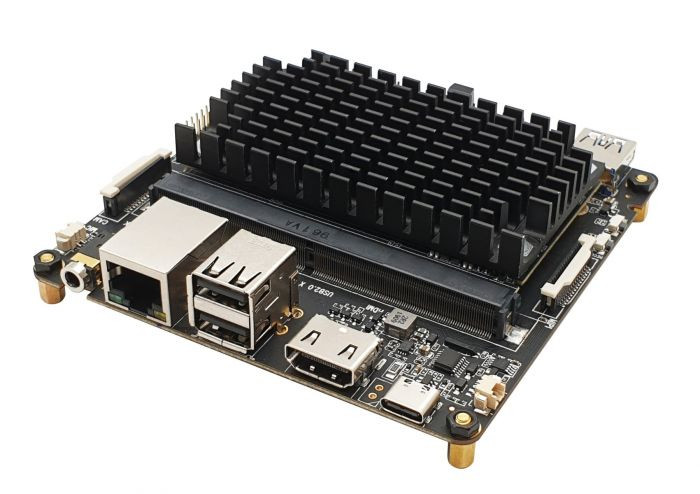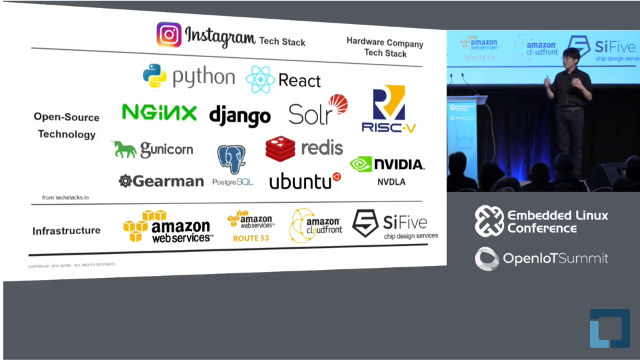ADLINK has just announced the availability of the Arm SystemReady SR-certified Ampere Altra Developer Platform equipped with the company’s COM-HPC Ampere Altra module with 32 to 80 64-bit Arm Neoverse N1 cores, 32GB to 128GB RAM. An adaptation to the earlier AVA Developer Platform expected to sell for $5,450, the Ampere Altra Developer Platform got a price cut to $3,999 at launch for a system with a 32-core processor, and 32GB DDR4. The system targets software developers wanting to build cloud-to-edge applications using standardized Arm hardware. Ampere Altra Developer Platform specifications: SoM – COM-HPC Ampere Altra module with Ampere Altra 32 to 80-core 64-bit Arm Neoverse N1 processor up to 1.7/2.2/2.6 GHz (32/64/80 cores, TPD: 60W to 175W), 32 GB to 128GB DDR4 ECC memory Storage – 128 GB NVMe M.2 SSD Mainboard – COM-HPC Server Base carrier board Video – VGA port Audio – 3.5mm audio jack Networking 1x […]
Raspberry Pi 4, Rockchip RK3399 SBC’s get Arm SystemReady IR certification
The first hardware platforms getting Arm SystemReady IR certification for IoT Edge applications were announced a few months ago with namely NXP i.MX 8 Mini evaluation kit and Compulab IOT-GATE-IMX8 gateway being able to run off-the-shelf operating system images such as Fedora IoT, OpenSuSE Leap 15.3, and Debian 11 thanks to UEFI firmware. But following PinePhone Pro Linux smartphone announcement, and Pine64 October update, we also learned that Rockchip RK3399 based RockPro64 was also Arm SystemReady IR certified, and check Arm’s website directly revealed it was joined by Lenovo Leez P710 “Gateway” SBC, as well as Raspberry Pi 4 and Pi 400 platforms. Let’s check the details and see what off-the-shelf images each board has been tested with. Pine64 RockPro64 RK3399 SBC achieved SystemReady IR v1.0 Level 1 certification meaning it complies with some waivers and workarounds found in the errata document. The board has been successfully tested with Fedora […]
Tiger Canyon Porcoolpine fanless Tiger Lake NUC announced for $679 and up
Simply NUC “Tiger Canyon Porcoolpine” is a fanless Intel NUC offered with a choice of Tiger Lake UP3 processors, notably Core i3-1115G4, Core i5-1135G7, and Core i7-1165G7, and equivalent vPro parts when available. The mini PC comes with up to 64GB DDR4, NVMe & SATA storage, a Thunderbolt 4 port, two HDMI 2.0b ports, 2.5 GbE networking, and optional Wi-Fi 6 and Bluetooth 5.1, as well as a DB9 serial port for industrial applications, for example, to connect a barcode scanner. Tiger Canyon Porcoolpine (NUC11TF) specifications: SoC (one or the other) Intel Core i3-1115G4 dual-core/quad-thread processor @ up to 3.0 / 4.1 GHz (Turbo) with 6MB L3 cache, 48EU Intel Xe graphics; 28W TDP Intel Core i5-1135G7 quad-core/octa-thread processor @ up to 2.4 / 4.2 GHz with 8MB L3 cache, 80EU Intel Xe graphics; 28W TDP Intel Core i5-1145G7 (vPro) quad-core/octa-thread processor @ up to 2.6 / 4.4 GHz with […]
The first Arm SystemReady IR certified platforms – NXP i.MX 8M Mini EVK & Compulab IOT-GATE-IMX8 gateway
A few months ago, we noted SolidRun HoneyComb LX2K became a certified Arm SystemReady ES platform. SystemReady is a certification program by Arm that ensures systems just work with generic operating systems like in the x86 world. When we looked at the details of the program in the article, we noted there were different categories including SystemReady ES for embedded servers and SystemReady IR for IoT Edge applications. The first SystemReady IR platform – NXP i.MX 8 Mini evaluation kit Arm has just announced the first SystemReady IR platform had just been certified. That device is the NXP i.MX 8M Mini EVK, and that means that anyone that uses the i.MX 8M family of devices with the associated Board Support Package (BSP) can build platforms that will pass the same certification process and boot compliant Linux distributions with minimal integration effort. We can see more details about the certifications on Arm developer’s website. NXP i.MX 8M Mini EVK achieved certification with NXP 2021 Q2 pre-release firmware, version LF […]
SolidRun HoneyComb LX2K becomes a certified Arm SystemReady ES platform
SolidRun HoneyComb LX2K is part of our list of the 5 most powerful Arm SBC’s in 2021. The mini-ITX board features an NXP LX2160A 16-core Arm Cortex-A72 processor, supports up to 64GB RAM, offers high-speed networking thanks to up to 4x SFP+ 10GbE cages and a Gigabit Ethernet port, as well as four SATA ports, a PCIe x8 slot, M.2 SSD slot and more. The board is ideal for networking applications and can be also be integrated into an Arm workstation for native application development. But just last month, we noted that while SolidRun talked about SBSA compliance a while ago, the status was unclear. The good news is that HoneyComb LX2K has just now become a certified Arm SystemReady ES (Embedded Server) compliant platform. Arm SystemReady is a set of standards and a compliance certification program that ensures systems just work with generic, off-the-shelf operating systems straight out of […]
Banana Pi BPI-F2S Industrial SBC Launched for $58 with Linux 4.19 based Debian or Fedora OS
Last month we covered Banana Pi BPI-F2S single board computer (SBC) for industrial, IoT, and smart audio application that was powered by the intriguing SunPlus SP7021 “Plus1” processor featuring four Cortex-A7 cores, one ARM9 ARM9 real-time core, and one 8051 I/O controller core, as well as up to 512MB built-in DDR3 RAM. At the time, the board was not available, and we had limited information about software support, except the company would provide a Yocto-based Linux distribution. The good news is that you can now buy Banana Pi BPI-F2S industrial SBC on Aliexpress for $58 and Taobao for 390 RMB, and the company released source code and OS images for the board. Here’s a reminder of Banana Pi BPI-F2S specifications: SoC – Sunplus SP7021 “Plus1” with a quad-core Cortex-A7 processor @ 1.0 GHz, one Arm A926 microprocessor, an 8051 core to handle I/Os, and 128MB or 512MB DDR3 DRAM. Storage […]
ROCK PI N10 RK3399Pro SBC Sells for $99 and up
Rockchip RK3399Pro processor is based on the popular Rockchip RK3399Pro hexa-core Arm Cortex-A72/A53 processor plus an embedded neural processing unit (NPU) delivering up to 3 TOPS for AI acceleration. So far you had to spend over $200 to get either Toybrick RK3399Pro board or 96Boards RK3399Pro development kit to get started with the processor. Some other companies announced their own RK3399Pro SBC such as Pine64 RockPro64-AI, or Khadas Edge board, but those are not available yet. But there’s now a more affordable Rockchip RK3399Pro SBC courtesy of Radxa’s Rock Pi N10 available on Seeed Studio in three variants: $99 model A with 4GB RAM (3GB for CPU/GPU + 1GB for NPU), 16GB eMMC flash $129 model B with 6GB RAM (4GB for CPU/GPU + 2GB for NPU), 32GB eMMC flash $169 model C with 8GB RAM (4GB for CPU/GPU + 4GB for NPU), 64GB eMMC flash Rock Pi N10 specifications: […]
RISC-V Keynote at Embedded Linux Conference 2018 (Video)
The Embedded Linux Conference and OpenIoT Summit 2018 have just started, and the Linux Foundation has already uploaded a few keynote videos to YouTube, including the one by Yunsup Lee, Co-Founder and CTO, SiFive, entitled “Designing the Next Billion Chips: How RISC-V is Revolutionizing Hardware”. Yunsup explains the current problem with chip development, and go through the open source RISC-V solutions offered by Sifive. Currently design a chip has a high upfront (NRE = non-recurring engineering) costs, is time-consuming (1.5 to 2 years at least) and silicon vendors normally target high volume production, but now many applications like IoT or machine learning require custom chips that may not be (yet) manufactured in such high volume. The solution is to adapt some idea from open source software to open source hardware in order to lower the costs, enable fast prototyping, and involve the community of designers and software developers. He took […]


